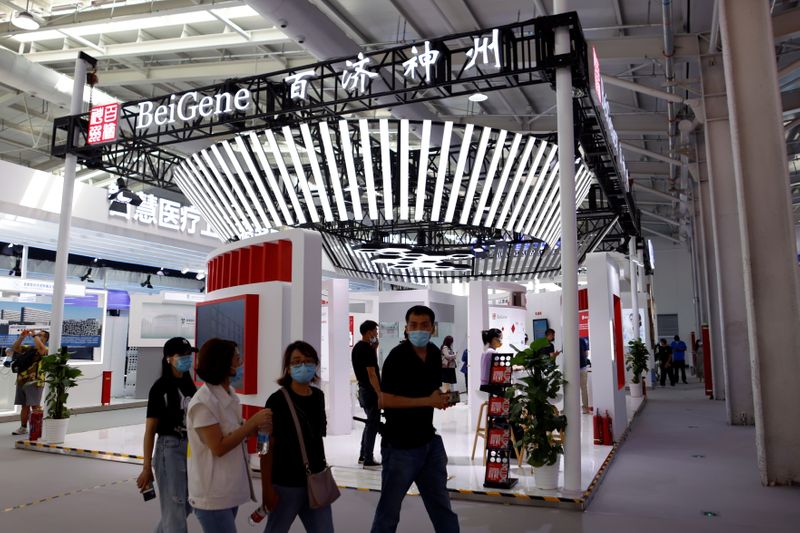By Farah Master
HONG KONG (Reuters) - If investors in China's biotech industry needed one more sign that the sector is coming of age, then a major licensing deal RemeGen Co Ltd struck last month with Seattle-based Seagen Inc fits the bill.
The agreement to co-develop cancer treatments using a RemeGen antibody drug conjugate is regarded as one of the biggest of its kind between a Chinese biotech and a Western firm. It provides for up to $2.4 billion in milestone payments, in addition to $200 million upfront as well as royalties if approved.
It is also at least the fifth out-licensing deal potentially worth more than $1 billion clinched by a Chinese biotech. Nearly all were signed in the past year, underscoring China's still small but growing role in developing innovative cancer drugs that will be used worldwide.
"China is clearly already an important and integral part of the global biopharma industry, not a separate ecosystem," said Franck Le Deu, senior partner at consultancy McKinsey in Hong Kong.
China's government has made cancer treatments a top priority for the industry. The world's most populous nation last year accounted for 30% of cancer deaths globally and 24% of newly diagnosed cases, according to one study.
Supportive policies for the sector over the past five years are also now bearing fruit and Western firms have come knocking at Chinese biotech doors.
For Seagen, the RemeGen deal will allow it to directly challenge breast cancer treatments from Roche Holding (SIX:ROG) and AstraZeneca/Daiichi Sankyo. The antibody also shows promise in tackling bladder and stomach tumours.
Other notable deals include a Novartis AG agreement worth up to $2.2 billion for a BeiGene Ltd drug. The two are co-developing an antibody similar to Keytruda from Merck and Opdivo from Bristol-Myers Squibb (NYSE:BMY) which help the immune system attack several different types of cancer and which have reaped billions of dollars in sales.
AbbVie (NYSE:ABBV) has also partnered with I-Mab to co-develop a monoclonal antibody for several types of cancer in a deal worth up to $1.9 billion.
FLOURISHING ON FUNDING
Chinese biotechs have proliferated in a relatively short amount of time - a key catalyst being the return of overseas-trained Chinese scientists, dubbed "sea turtles", that began a decade ago and who have become increasingly attracted by domestic opportunities as the government pushes to develop the industry.
More recently, China in 2017 and 2018 aligned regulatory standards with international norms, rapidly speeding up the review system for new drugs. The sector also has seen a surge in funding after Hong Kong's stock exchange changed its rules in 2018 to allow listings of biotechs that have yet to earn revenue.
Success in the West is still fledgling - just three drugs developed in China which include BeiGene's Brukinsa for a type of non-Hodgkin's lymphoma - have been approved by the U.S. FDA.
Investors are also concerned about frothy valuations and it remains unclear how many firms will succeed due to the lengthy process of drug discovery and the massive costs involved. That said, there appears to be more than enough funding to propel the industry.
"We are looking at a turning point because of the capital supply and the regulatory approval regime," said Simone Song, founding partner of healthcare venture capital fund ORI Capital.
Nineteen Chinese biotechs made their trading debuts last year, mostly in Hong Kong, raising a combined $5.2 billion, up from 13 raising around $2 billion in 2019, Refinitiv data shows. So far this year, 20 have listed, raising $4.6 billion and the Hong Kong bourse has flagged nearly 30 more in the pipeline.
According to McKinsey's Le Deu, the combined market value of Chinese biotechs listed in Hong Kong, on Shanghai's STAR board and on the Nasdaq was some $180 billion as of May, which compares to just $1 billion in 2016.
GLOBAL AMBITIONS
The number of large out-licensing pacts for Chinese biotechs is only set to grow, industry experts say.
I-Mab, Innovent Biologics, Junshi Biosciences and Legend Biotech are likely candidates for further licensing deals with Western firms, said Morningstar analyst Jay Lee, citing their existing partnerships and pipeline assets.
I-Mab says it is seeking strategic partners to help develop and commercialise its products, while Legend said it is open to collaboration. Junshi and Innovent did not respond to requests for comment.
Legend was in 2017 one of the first Chinese biotechs to win an out-licensing deal with a major Western pharmaceutical firm. Its CAR-T bone marrow cancer drug co-developed with Johnson & Johnson (NYSE:JNJ) is set to be reviewed by the FDA in November.
Though few in number, the more established Chinese biotechs have even bigger ambitions.
BeiGene, which is 20.5% owned by Amgen Inc (NASDAQ:AMGN) and valued at $34 billion, out-licenses some products but built its own U.S. and European sales teams for Brukinsa. It has also announced it will build a new R&D and manufacturing centre in New Jersey.
"We are really trying to brand ourselves as a global company...we just happen to have labs right now in China," said Angus Grant, BeiGene's chief business executive.
Hutchmed, the first Chinese company to have an in-house innovative cancer drug unconditionally approved in China, is not planning to partner in the United States or at home now that it has grown, said Chief Executive Christian Hogg.
"We have got around $1.2 billion in cash on our balance sheets, we have got the capabilities, resources, financial and organisational resources to pretty much do whatever we want to do outside of China," he said.
